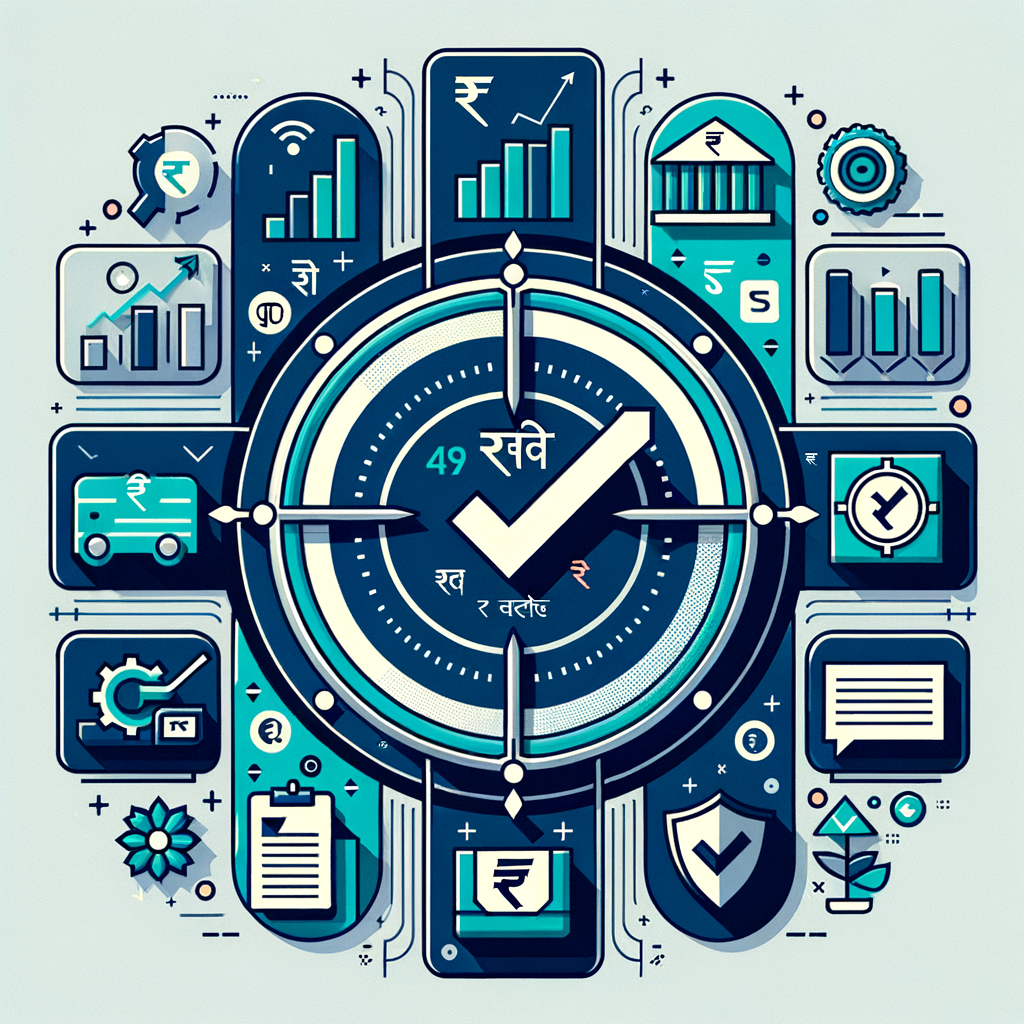The Role of Credit Scores in Effective Debt Management
Meta Description: Discover the crucial role of credit scores in debt management for salaried individuals and small business owners in India. Learn actionable strategies to improve your financial health with TaxRobo.
The Role of Credit Scores in Effective Debt Management
Planning to apply for a home loan, expand your business, or simply achieve financial freedom? The key might be a three-digit number you’re not paying enough attention to. This number, your credit score, is more than just a metric for lenders; it’s a powerful indicator of your financial health. Debt management, on the other hand, is the strategic process of controlling and eliminating debt. The critical connection between these two concepts is the foundation of a secure financial future. Understanding the importance of credit scores in India is the first step, but mastering the role of credit scores in debt management is what truly empowers you to take control. This guide will explore this vital link, offering actionable insights for Indian professionals and entrepreneurs to navigate their financial journey with confidence.
Understanding Your Credit Score: The Foundation of Financial Health
Before you can leverage your credit score to manage debt, you need to understand what it is and how it’s calculated. Think of it as your financial report card, a summary of your history with credit. For lenders, it’s a quick way to assess the risk of lending you money. For you, it’s a mirror reflecting your financial habits and a tool you can use to unlock better financial opportunities. A strong understanding is crucial for any salaried individual or business owner looking to build a stable financial future in India’s dynamic economy.
What is a Credit Score in the Indian Context?
In India, a credit score is a three-digit number, typically ranging from 300 to 900, that summarises your credit history and represents your creditworthiness. This score is calculated by four main credit information companies, or credit bureaus, licensed by the Reserve Bank of India (RBI): TransUnion CIBIL, Experian, Equifax, and CRIF High Mark. While each bureau has its own scoring model, the CIBIL score is the most widely recognised by lenders across the country. When you apply for a loan or a credit card, lenders pull your credit report from one of these bureaus to evaluate the risk associated with your application. A higher score signifies lower risk, making you a more attractive borrower. For a clear picture of understanding credit scores for Indian consumers, it’s essential to know that this number is not static; it changes based on your financial activities.
Actionable Tip: You are legally entitled to one free full credit report (including score) from each of the four credit bureaus once a year. It’s a wise practice to check your score regularly to stay informed about your financial standing. You can find more information directly on the CIBIL website.
Key Factors That Shape Your Credit Score
Your credit score is not an arbitrary number. It is a calculated result based on specific data points in your credit report. While the exact formulas used by bureaus are proprietary, they generally assign weightage to the following factors. Knowing these is the first step to figuring out how credit scores affect loans in India and how you can actively improve your rating.
- Payment History (Approx. 35% Weightage): This is the single most important factor. Your history of making timely payments on your EMIs (Equated Monthly Instalments) and credit card bills heavily influences your score. Even a single missed or delayed payment can have a negative impact and stay on your report for years. Consistency is key.
- Credit Utilization Ratio (Approx. 30% Weightage): This refers to the percentage of your available credit that you are currently using. For example, if you have a credit card with a ₹1,00,000 limit and your outstanding balance is ₹40,000, your credit utilization ratio (CUR) is 40%. A high CUR suggests that you are heavily reliant on credit and may be overextended, which lenders view as a risk. Financial experts recommend keeping your overall CUR below 30%.
- Length of Credit History (Approx. 15% Weightage): A longer credit history generally contributes positively to your score, provided it’s a history of responsible credit use. It gives lenders more data to assess your long-term financial behaviour. This is why it’s often advisable not to close your oldest credit card account, even if you don’t use it frequently.
- Credit Mix (Approx. 10% Weightage): Lenders like to see that you can responsibly manage different types of credit. A healthy credit mix includes both secured loans (like a home loan or auto loan, which are backed by an asset) and unsecured loans (like personal loans or credit cards). This diversity demonstrates your ability to handle various financial obligations.
- New Credit Inquiries (Approx. 10% Weightage): When you apply for a new loan or credit card, the lender makes a “hard inquiry” on your credit report. Too many hard inquiries in a short period can lower your score, as it may signal to lenders that you are in financial distress and desperate for credit.
The Direct Impact: How Credit Scores Influence Debt Management
Your credit score is not just a passive number; it is an active and powerful tool in your financial arsenal. It directly influences your ability to manage, reduce, and ultimately eliminate debt. The credit score importance in debt management India cannot be overstated, as it dictates the cost of borrowing, the options available to you, and the overall ease with which you can navigate your liabilities. A high score opens doors to favourable terms, while a low score can trap you in a cycle of high-cost debt that becomes increasingly difficult to escape.
A High Credit Score: Your Best Ally in Managing Debt
Having a good credit score (generally considered 750 and above) is your single greatest advantage when it comes to managing debt through credit scores in India. It signals to lenders that you are a reliable and low-risk borrower, and they will compete for your business by offering you their best products and terms. This leverage translates into tangible financial benefits that make debt management significantly easier and more effective.
- Benefit 1: Lower Interest Rates: A higher credit score directly translates to lower interest rates on loans. Lenders reserve their most competitive rates for the most creditworthy applicants. Over the life of a loan, even a small difference in the interest rate can save you lakhs of rupees.
Example: The Power of a Good Score on a ₹5 Lakh Personal Loan (5-Year Term)
| Credit Score | Assumed Interest Rate | Monthly EMI | Total Interest Paid | Total Savings |
|---|---|---|---|---|
| 780+ | 11.0% p.a. | ₹10,871 | ₹1,52,276 | – |
| 680 | 16.0% p.a. | ₹12,157 | ₹2,29,403 | ₹77,127 |
- Benefit 2: Access to Debt Consolidation: Debt consolidation involves taking out a single, new loan to pay off multiple existing debts, often with higher interest rates (like credit card debt). A person with a high credit score can easily qualify for a personal loan at a favourable interest rate, use it to clear all their credit card dues, and be left with just one manageable EMI, saving a significant amount on interest.
- Benefit 3: Favourable Loan Terms & Balance Transfers: Beyond just interest rates, a good score gives you access to better loan terms, such as longer repayment tenures or zero-processing-fee offers. It also makes you eligible for balance transfer credit cards, which often come with a 0% introductory Annual Percentage Rate (APR) for a specific period (e.g., 6-12 months). This allows you to transfer high-interest card debt and pay it off interest-free during the promotional period.
A Low Credit Score: The Vicious Cycle of Debt
Conversely, a low credit score (typically below 650) creates significant hurdles in your debt management journey. It paints a picture of high risk to potential lenders, leading them to either reject your applications outright or approve them with highly unfavourable terms. This can create a vicious cycle where managing existing debt becomes more expensive and difficult, further damaging your score and limiting your future options. The relationship between credit scores and debt recovery in India also becomes more pronounced, as a history of defaults can lead to more stringent collection measures from lenders.
- Consequence 1: Higher Interest Costs: Lenders compensate for the perceived high risk of lending to someone with a poor credit score by charging much higher, often punitive, interest rates. This means a larger portion of your EMI goes towards servicing the interest rather than reducing the principal amount, effectively keeping you in debt for longer and costing you significantly more.
- Consequence 2: Loan Rejection and Limited Options: When you have a low score, your access to helpful financial tools is severely restricted. Your applications for debt consolidation loans, balance transfer credit cards, or any form of new, affordable credit are likely to be rejected. This traps you with your existing high-cost debts, making it nearly impossible to restructure them into a more manageable form.
- Consequence 3: Challenges in Debt Recovery and Stricter Terms: A credit report that shows a history of defaults or late payments (the cause of a low score) puts you at a disadvantage. Lenders may be less willing to negotiate repayment terms or offer settlements. In cases of default, they may initiate more aggressive follow-ups and recovery procedures, adding immense stress to an already difficult financial situation.
Actionable Strategies for Salaried Individuals & Small Business Owners
Knowing the impact of your credit score is one thing; using that knowledge to actively manage your debt is another. For salaried employees and small business owners, a proactive approach is essential. Here are practical, step-by-step debt management strategies for Indian salaried employees and entrepreneurs to leverage their credit information for financial freedom.
Step 1: Use Your Credit Report as a Debt Diagnosis Tool
Your detailed credit report is more than just a score; it’s a comprehensive map of your financial liabilities. The first step towards effective debt management is to use this report as a diagnostic tool. Download your full report from one of the credit bureaus. Go through the “Account Information” section carefully and create a master list of all your active credit accounts. For each account—be it a personal loan, home loan, credit card, or business loan—note down the following:
- The name of the lender
- The total outstanding balance
- The current interest rate
- The monthly EMI or minimum payment due
This exercise provides a crystal-clear, consolidated view of your total debt. It removes guesswork and allows you to see which debts are costing you the most in interest, forming the factual basis for your repayment plan.
Step 2: Implement a Proven Debt Repayment Strategy
Once you have a clear picture of your debts, you need a strategy to tackle them systematically. Two of the most popular and effective debt management tips for salaried individuals India are the Debt Avalanche and Debt Snowball methods. The best one for you depends on your personality and what motivates you.
- The Debt Avalanche Method (Financially Optimal): With this method, you continue to make the minimum payments on all your debts but allocate any extra funds you have towards the debt with the highest interest rate first. Once that debt is cleared, you roll that entire payment amount over to the debt with the next-highest interest rate.
- Best for: Individuals who are disciplined and motivated by numbers, as this method saves the most money on interest over time.
- The Debt Snowball Method (Psychologically Powerful): Here, you focus on paying off the debt with the smallest outstanding balance first, regardless of the interest rate, while making minimum payments on the others. Once the smallest debt is gone, you “snowball” that payment amount onto the next-smallest debt.
- Best for: Individuals who need quick wins to stay motivated. The psychological boost of clearing a debt completely can provide the momentum needed to tackle larger ones.
Step 3: Proactively Build and Maintain Your Score
Debt repayment is only one part of the equation. Simultaneously, you must adopt habits that build and protect your credit score for the long term. This ensures that as you pay down debt, your score improves, opening up better financial opportunities in the future.
- Automate Your Payments: Set up auto-pay or standing instructions for all your EMIs and at least the minimum due amount on your credit cards. This is the single most effective way to ensure you never miss a payment, protecting the most crucial component of your credit score.
- Pay More Than the Minimum: Always try to pay your credit card bill in full each month. If that’s not possible, pay as much as you can above the minimum amount. This reduces your principal faster and keeps your credit utilization ratio low.
- Preserve Your Credit History: Avoid closing old credit card accounts, especially your oldest one. Closing an old account can shorten the average length of your credit history, which can negatively impact your score.
- Monitor and Dispute Errors: Review your credit report at least once a year for any inaccuracies, such as accounts you don’t recognize or incorrect payment statuses. If you find an error, file a dispute with the credit bureau immediately to have it corrected.
Beyond Debt: The Role of Credit Scores in Financial Planning
The true power of a good credit score extends far beyond just managing existing debt. It is a cornerstone of long-term financial planning and wealth creation. The role of credit scores in financial planning India is pivotal, acting as a key that unlocks major life and business milestones. A healthy score is not merely a defensive tool to get out of financial trouble; it’s an offensive asset that helps you build the future you envision.
Whether you are a salaried professional dreaming of buying a home or a small business owner aiming to scale your operations, your credit score will play a decisive role. It determines your ability to secure a mortgage with a competitive interest rate, which can save you lakhs over the loan’s tenure. For an entrepreneur, a strong personal credit history is often the gateway to securing a business loan for expansion, purchasing new equipment, or managing cash flow. It impacts your ability to fund your children’s higher education with an education loan or even get a better premium on certain types of insurance. In essence, maintaining a high credit score is a continuous investment in your financial future, ensuring that when opportunities arise, you are in the strongest possible position to seize them.
Conclusion
Your credit score is a dynamic and powerful reflection of your financial discipline. It is far more than a mere number; it is one of the most vital tools at your disposal for achieving financial stability and growth. As we’ve explored, the connection between credit scores in debt management is direct and impactful. A high score can be your greatest ally, providing access to lower interest rates and flexible financial products, while a low score can trap you in a costly and stressful cycle of debt. By understanding the factors that influence your score, using your credit report as a diagnostic tool, and implementing strategic repayment and credit-building habits, you can transform your financial narrative. Taking control of your credit score is synonymous with taking control of your financial future, paving the way for not just debt freedom, but long-term prosperity.
Feeling overwhelmed by debt or unsure how to improve your financial standing? TaxRobo’s financial experts can help you create a personalized plan. Contact us today for a consultation.
Frequently Asked Questions (FAQs)
1. How often should I check my credit score in India?
It’s a good practice to check your score at least once every 3-4 months and your detailed credit report annually. A soft check on your score gives you a quick snapshot of your financial health, while the annual detailed report helps you track progress, review all your accounts, and spot any fraudulent activity or errors early.
2. Will checking my own credit score lower it?
No. When you check your own credit score or report directly from a credit bureau or an authorized financial institution, it is considered a “soft inquiry.” Soft inquiries are for your personal information and have absolutely no impact on your credit score. A “hard inquiry,” which occurs only when a lender checks your score as part of a formal loan or credit card application, can have a minor, temporary negative impact.
3. How long does it take to repair a bad credit score in India?
The time it takes to repair a bad credit score depends on the severity and nature of the negative factors on your report. If the low score is due to high credit utilization, you can see a positive change within a few months of paying down your balances. However, if it’s due to more serious issues like late payments, defaults, or a loan settlement, it takes longer. Consistent, on-time payments can start showing a positive effect within 6-12 months, but completely rebuilding a very low score can take several years as negative information eventually ages off your report.
4. As a small business owner, does my personal credit score affect my business loan?
Yes, absolutely. For new businesses, sole proprietorships, partnerships, and even many private limited companies, lenders heavily rely on the personal credit scores of the promoters or directors. Your personal CIBIL score is seen as a primary indicator of your financial reliability and discipline. A strong personal credit score significantly improves your chances of getting a business loan approved and securing favourable terms.



